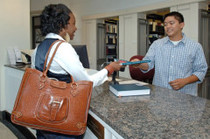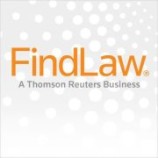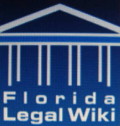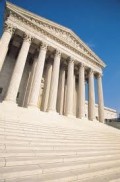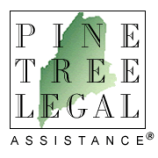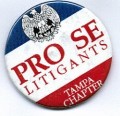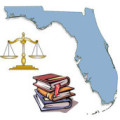The Pro Se Page (self representation)
Pro se legal representation
Wikipedia
Pro se legal representation means advocating on one's own behalf before a court, rather than being represented by a lawyer. This may occur in any court proceeding,
whether one is the defendant or plaintiff in civil cases, and when one is a defendant in criminal cases. Pro se is a Latin phrase meaning "for oneself" or "on one's own behalf". This status is
sometimes known as propria persona (abbreviated to "pro per"). In England and Wales the comparable status is that of "litigant in person". Read more
The old adage is, "He who represents himself has a fool for a client." The reality has become,
"He who is represented is usually taken for a fool."
Man Wins 2-Year Pro Se Court Battle Over $25 Ticket,
Says Case Was ‘Like Doing My Own Dentistry’
ABA Journal Law News Now
by Martha Neil
July 18, 2011
After a two-year court battle, a retired Massachusetts audio visual technician has emerged victorious in an epic pro se legal fight over a $25 parking
ticket.
But Michael Rivers was drained by the experience rather than jubilant over his state superior court win against the city of Springfield, according to the Republican.
He contends he should easily have won the case at the administrative level, since the meter was apparently defective. Familiar with the havoc that "gunk" can wreak on
mechanical equipment, due to his former job, he took photos of the gummed-up device but failed to prevail when he initially protested the ticket.
After paying a $300 filing fee, Rivers at first lost for failing to appear. But he successfully argued that he was never notified of the hearing date, pointing out that
he would be unlikely to fork over $300 and then ignore a hearing date, the newspaper recounts.
"I prosecuted the case without legal help—something I will never do again," he tells the newspaper, noting that the case took up hundreds of hours of his time. "It was
painful, like doing my own dentistry." more
Related story July 18, 2011 by Jack Flynn, The Republican
In an Opinion by Circuit Judge Richard Posner in Prude v. Clarke, No. 11-2811, Court of Appeals, 7th Circuit, decided March 27, 2012, the Court reaffirmed U.S. Supreme Court rulings that complaints filed by unrepresented persons are supposed to be construed liberally. E.g., McNeil v. United States, 508 U.S. 106, 113 (1993); Haines v. Kerner, 404 U.S. 519, 520 (1972) (per curiam); Marshall v. Knight, 445 F.3d 965, 969 (7th Cir. 2006); Chavis v. Chappius, 618 F.3d 162, 170-71 (2d Cir. 2010).
Prude v. Clarke related story, ABA Journal Law News Now
Opinion, Prude v. Clarke, No. 11-2811.pd[...]
Adobe Acrobat document [89.0 KB]
Federal Decisions Supporting Pro-Se Litigants, U.S. Law Books
Pro Se by Caught.net Legal Reform
CASES ON PRO SE RIGHTS
FRCP Rule 8(e) Construing Pleadings. Pleadings must be construed so as to do
justice.
It could also be argued that to dismiss a civil rights action or other lawsuit in which a serious factual pattern or allegation of a cause of action has been made would
itself be violative of procedural due process as it would deprive a pro-se litigant of equal protection of the law visa vis a party who is represented by counsel.
25 Cases and Headnotes Supporting Pro-Se Litigants
Results of legal research May 1, 2010 supporting pro-se litigants, 25 cases with headnotes. Cases in the U.S. Court of Appeals for the Eleventh Circuit (C.A.11). Some C.A.5 cases appear that predate the C.A.11. In PDF below. (Red flag cases are no longer good). Cases should be rechecked - research is X years old.
Cases supporting pro se litigants
2010, 05-01-10, pro se cases, Westlaw Cu[...]
Adobe Acrobat document [91.7 KB]
Library of Congress, THOMAS
THOMAS was launched in January of 1995, at the inception of the 104th Congress. The leadership of the 104th Congress directed the Library of Congress to make federal
legislative information freely available to the public. Since that time THOMAS has expanded the scope of its offerings to include the features and content listed below. Read more here
Library of Congress Wikipedia
Library of Congress THOMAS, Wikipedia
Library of Congress Facebook
LawGuru.com Internet Law Library
The Internet Law Library (formerly the U.S. House of Representatives Internet Law Library) was originally provided to the public courtesy of the Office of the Law Revision Counsel of the U.S. House of Representatives. This was part of the Counsel's mission to make the law available to the public. more
Georgetown Law Library
111 G. Street
N.W. Washington, DC 20001
(202) 662-9131
Georgetown Law Library Circulation Desk
Georgetown Law Library Florida Resources
This State Guide lists the major sources of law in this state. If you are a member of the Georgetown University community, the reference librarians are happy to assist you over the phone (202) 662-9140 or by email.
Receive Justia's FREE Daily Newsletters of Opinion Summaries for the US Supreme Court, all US Federal Appellate Courts & the 50 US State Supreme Courts and Weekly
Practice Area Opinion Summaries Newsletters.
Open Jurist
OpenJurist's mission is to provide access to published United States legal opinions, Code and legal resources without charge.
Leagle.com
Leagle, Inc. is a leading provider of copies of primary caselaw from all Federal courts and all State higher courts. Our collection is up to date within 24 hours of
release of opinions from the courts and is also complete historically for all time for Federal courts and back to 1950 for state appellate and supreme courts. We add Slip Opinions daily, and Advance
Sheets and Bound Volume copies as they become available. Our materials are fully copyrighted Leagle, Inc.
Fastcase
Fastcase is the leading next-generation legal research service that puts a comprehensive national law library and smarter and more powerful searching, sorting, and
visualization tools at your fingertips. Fastcase’s libraries include primary law from all 50 states, as well as deep federal coverage going back to 1 U.S. 1, 1 F.2d 1, 1 F.Supp. 1, and 1 B.R. 1. The
Fastcase collection includes cases, statutes, regulations, court rules, and constitutions. Fastcase also provides access to a newspaper archive, legal forms, and a one-stop PACER search of federal
filings through our content partners. Read more here
Findlaw
FindLaw, a Thomson Reuters business, providers consumers and lawyers with a range of case law, statutes, legal news, online career center, blogs and a variety of
community-oriented tools. What began as a list of legal internet resources for law librarians has since grown into the world's leading provider of online legal information. To make legal information
accessible and understandable. Whether a lawyer or a lay person, FindLaw strives to provide a forum for users to engage with the law and the legal community. more
Findlaw for Legal Professionals
FindLaw for Legal Professionals is a comprehensive site designed especially for lawyers and legal professionals. FindLaw, a Thomson Reuters business, providers consumers
and lawyers with a range of case law, statutes, legal news, online career center, blogs and a variety of community-oriented tools. Our mission is simple -- to provide attorneys and other legal
professionals with up-to-date news and information that affects the legal profession uniquely, including legal technology news, practice tips and firm management information.
LoislawConnect
Legal information when, where and how you need it. LoislawConnect provides you access to comprehensive legal information from multiple resources in one convenient online
location. Link to a wide variety of content to support your legal research needs including Primary Law, Federal and State Law, Treatise Libraries, Bar Publications, Public Records and more.
more
LoislawConnect YouTube Channel
Wolters Kluwer Wikipedia
Free Advice
FreeAdvice has been providing millions of consumers with outstanding advice, free, since 1995. While not a substitute for personal advice from a licensed professional,
it is available AS IS, subject to our disclaimer and conditions of use. more
Florida State Courts
Supreme Court of Florida official site
The Florida Supreme Court not only is the highest court in Florida, its Chief Justice oversees the entire State Courts System. This includes many management functions centralized in Tallahassee in the Office of the State Courts Administrator, and regulation of The Florida Bar.
Supreme Court of Florida Wikipedia
The Supreme Court of the State of Florida is the highest court in the U.S. state of Florida. The Supreme Court consists of seven judges: the Chief Justice and six
Justices who are appointed by the Governor to 6-year terms and remain in office if retained in a general election near the end of each term. The Court is the final arbiter of Florida law, and its
decisions are binding authority for all other Florida state courts. more
Courts of Florida, Wikipedia
Florida State Courts
Links to all Florida Courts
Florida State Courts Administration
On July 1, 1972, the Office of the State Courts Administrator (OSCA) was created with initial emphasis on the development of a uniform case reporting system to provide
information on activity in the judiciary in the preparation of its operating budget and in projecting the need for judges and specialized court divisions.
The State Courts Administrator serves under the direction of the Chief Justice of the Florida Supreme Court and the other six justices and oversees the operation of
numerous court initiatives and administrative functions. more
Clearwater attorney Brian Willis has spearheaded an ambitious project called Florida Legal Wiki that seeks to make Florida law more accessible to the general public. Florida Legal Wiki operates like Wikipedia, with users signing up and contributing their expertise to build entries on various legal topics. There is one important caveat; users must register using their email address, ensuring there is some measure of accountability for contributors. Mr. Willis encourages users to contribute to a topic, even if they do not have the time to finish the entire topic. So, whether you can contribute a few sentences, or a complete an entire topic, consider contributing to the Florida Legal Wiki.
Florida Rules of Appellate Procedure
Florida Rules of Civil Procedure
Florida Rules of Criminal Procedure
Florida Family Law Rules of Procedure
Florida Family law forms (from OSCA)
Jenkins v. State of Florida, 382 So.2d 83 (Fla. 4th DCA 1980), per curiam affirmed decisions, no appeal to Florida Supreme Court.
The United States Courts
The U.S. Courts are an independent, national judiciary providing fair and impartial justice within the jurisdiction conferred by the Constitution and Congress. As an equal branch of government the federal Judiciary preserves and enhances its core values as the courts meet changing national and local needs. more.
The Federal Judiciary YouTube Channel
Representing Yourself in Federal Court
United States District Court
Northern District of New York
Hon. Gary L. Sharpe, Chief Judge
If you wish to start a civil action in federal court, but do not have an attorney to represent you, you may bring your case on your own. This is called "proceeding pro
se" which means that you are representing yourself in the Court, and you are called a "pro se litigant."
A civil case, which is the only type of case you can start in federal court, is different from a criminal case, which can only be started by government officials. In a
civil case, you do not have a constitutional right to appointed counsel. Therefore, if you start a civil case pro se, you should be prepared to pursue it to completion on your own because the Court
appoints counsel only under certain circumstances that may not be met by your case.
The Court can provide you with certain types of assistance to make it a little easier to bring your case pro se in federal court. Read the Pro Se Handbook before you start your case, so that you understand the help the Court can provide and so that you
become familiar with the forms the Court can make available to you and the Rules you must follow in the Court. more
ProSeHandbook2008, ND NY.pdf
Adobe Acrobat document [224.6 KB]
2012_Pro_Se_Brochure.pdf
Adobe Acrobat document [256.3 KB]
Northern District of California Pro Se Handbook
Northern District of California Pro Se Handbook
available in English, Spanish and Chinese
A recommended starting point is the court's Handbook for Litigants Without a Lawyer, which can be downloaded here or is available free of charge from the Clerk's Office Read more here
Richard Wieking Clerk, August 2011
ProSe-Handbook.pdf
Adobe Acrobat document [1.2 MB]
U.S. District Court - District of Idaho Pro Se Handbook
Pro Se Handbook, U.S. District Court Ida[...]
Adobe Acrobat document [220.0 KB]
PACER - Public Access to Court Electronic Records
The Case Management/Electronic Case Filing (CM/ECF) system is the Federal Judiciary's comprehensive case management system for all bankruptcy, district and appellate
courts. CM/ECF allows courts to accept filings and provide access to filed documents over the Internet.
CM/ECF keeps out-of-pocket expenses low, gives concurrent access to case files by multiple parties, and offers expanded search and reporting capabilities. The system
also offers the ability to: immediately update dockets and make them available to users, file pleadings electronically with the court, and download documents and print them directly from the court
system.
Official Web Site PACER Case Search Sign In
US District Court, Middle District of Florida PACER login
PACER (law), Wikipedia
PACER (acronym for Public Access to Court Electronic Records) is an electronic public access service of United States federal court documents. The system is managed by
the Administrative Office of the United States Courts. It allows users to obtain case and docket information from the United States district courts, United States courts of appeals, and United States
bankruptcy courts. more
PACER, Public Access to Court Electronic Records, allows online access to federal court documents and pleadings
for .10 cents a copy, from the comfort of you home or office. In contrast Florida state court charges $1.00 per page for copies and there is no online access. You must travel to the courthouse, wait
in line, and pay the Clerk $1.00 per page. In addition there are travel expenses like gas and parking. For PACER you will need an account.
In federal court you may be able to e-file documents with permission of the court. Below is a template for a motion to e-file using the court’s CM/ECF system. (Case
Management/Electronic Case Filing). The template is courtesy of the Northern District of California. If the court grants
permission to e-file, your will need a CM/ECF account in addition to a PACER account.
A "live" form is here in the Civil Litigation Packets
The promise of the federal courts, in contrast to the state court system, is judicial independence. The title of federal judge means a judge appointed by the President of the United States and confirmed by the United States Senate in
accordance with the United States Constitution, also known as an Article III federal judge. Article III federal judges serve "during good behavior" and often paraphrased as appointed "for life".
Judges hold their seats until they resign, die, or are removed from office. Federal judges have perhaps the best job security available in the United States. Moreover, the Constitution forbids
Congress to diminish a federal judge's salary.
In the United States federal courts, magistrate judges are appointed to assist
United States district court judges in the performance of their duties. Magistrate judges are authorized by 28 U.S.C. §
631. Magistrate judges are appointed by a majority vote of the federal district judges of a particular district and serve terms of eight years if full-time, or four years if part-time, and may be
reappointed. Magistrate judges of limited tenure are sometimes referred to as Article I judges. Article I judges are not subject to the Article III protections. For example, these judges do not enjoy
life tenure, and Congress may reduce their salaries.
Because Article III of the United States Constitution vests the judicial powers in courts to which the judges are appointed for life (and which are therefore called
Article III tribunals), decisions of a magistrate judge are subject to review and either approval, modification or reversal by a district judge of that court, except in civil cases where the parties
consent in advance to allow the magistrate judge to exercise the jurisdiction of the district judge. more
NOTICE to pro se litigants about U.S. Magistrate Judges
The ordinary person, or pro se litigant, may not understand the significant difference between a U.S. magistrate judge, and federal
judge, also known as an Article III judge. Be aware that the difference between these two types of judges is important and significant, especially to the pro se litigant.
In short, an Article III federal judge is the real deal, while a U.S. magistrate judge is not. In the typical federal civil lawsuit both kinds of judges often preside over the same case.
As outline above, an Article III federal judge is thought to be truly independent because of the lifetime appointment by the President of the United States and confirmation by the United States
Senate in accordance with the United States Constitution.
In contrast, a U.S. magistrate judge has a limited term, depends on the approval of his peers for reappointment, and therefore is not truly independent. In other words,
a U.S. magistrate judge faces some of the same pitfalls of a state court judge.
Federal Judgeships U.S. Courts
website
United States federal judge Wikipedia
Magistrate Judge U.S. Courts
website
United States magistrate Wikipedia
The following case illustrates the role of the magistrate judge and federal judge, and some of the pitfalls involved. In Armor Screen Corp v. Storm Catcher, Inc., 709 F.Supp.2d 1309, S.D. Florida, the federal U.S. District Court Judge, Kenneth L. Ryskamp, adopted Report and Recommendation (on disqualification of counsel) of Ann E. Vitunac, the U.S. Magistrate Judge, and disqualified counsel.
A magistrate Report and Recommendation is authorized under 28 U.S.C. § 636. As shown in the
Armor Screen Corp. case, a party shall serve and file written objections, if any, to the Report and Recommendation with the U.S. District Judge within fourteen (14) days after being
served with a copy. See 28 U.S.C. § 636(b)(1)(C), Failure to file timely objections may limit the scope of appellate review
of factual findings contained herein.
The forgoing is provided without charge for educational purposes only. Contact a licensed attorney for legal advice.
709 F.Supp.2d 1309, S.D. Florida
Armor Screen Corp v. Storm Catcher, Inc,[...]
Adobe Acrobat document [1.4 MB]
Rule 59. Matters Before a Magistrate Judge
Federal Rules of Criminal Procedure
Cornell University Law School
28 USC § 455 - Disqualification of justice, judge, or magistrate judge
(a) Any justice, judge, or magistrate judge of the United States shall disqualify himself in any proceeding in which his impartiality might reasonably be
questioned. Read more here
2007, 08-13-07, Order of recusal, Magist[...]
Adobe Acrobat document [32.5 KB]
Biographies of Federal Court Judges Sitting in Florida
The following biographies of Federal Court Judges sitting in Florida were compiled during the summer of 2011. Each judge was sent a questionnaire and responded by
listing year of current appointment, prior judgeships, birth dates, education and previous legal employment. Some judges also provided additional information relating to teaching positions,
professional associations, honors and awards, and published works. The questionnaire was informal and voluntary. Entries for judges who did not respond to the questionnaire were compiled from
secondary sources. more
The Pro Se Law Center
A resource center on self-representation in civil legal matters. Our purpose is to provide a collection of materials and resources
that can be used to create legal service delivery systems that are based on the concept of "pro se" or "self" representation within federally funded legal services programs, courts, pro bono
programs, and other community-based programs.
American Judicature Society Dissolving
On September 26, 2014, the Board of Directors of the American Judicature Society (AJS) approved a plan to dissolve the Society and wind up its
affairs.
Pine Tree Legal, Pro Se Assistance
Pro Se means "For Yourself." It refers to people who represent themselves in court or with a non-court legal problem. There are a lot of websites that provide some pro
se information. If you have to represent yourself in court or deal with a legal problem by yourself, be careful.
Responsive Law
Consumers for a Responsive Legal System
We are ordinary citizens who believe the legal system can and must do better. Consumers should be able to handle their own legal affairs without a lawyer and, when they
do need legal representation, it should be affordable and service-oriented. Just as importantly, lawyers and judges should be accountable for the quality of their work and for how they treat the
people they are meant to serve. Please join us in working positively and productively for a better legal system.
Cornell University Law School Legal Information Institute
An excellent legal research tool
Report, Pro Se: Meeting the challenge of self-represented litigants
To Chief Justice Shirley S. Abrahamson (left) Wisconsin Supreme Court
Submitted by The Wisconsin Pro Se Working Group, December 2000
prosereport.pdf
Adobe Acrobat document [291.7 KB]
Wites & Kapetan, PA
The Florida Litigation Guide
Marc A. Wites, Esq., author
The Florida Litigation Guide provides, for more than 59 Florida common law causes of action, each action's:
1. Elements;
2. Case Citations From The Most Recent Decision From Each
3. State And Federal Court That Cites The Action's Elements; And
4. Statute Of Limitations, As Well As
5. Defenses To The Action
I am often asked how I thought of the idea for The Florida Litigation Guide. The answer likely conjures up memories – good and bad - for all lawyers of the trials and tribulations of life as a first-year associate. During my first year of practice, senior lawyers in the firm routinely asked me to find a case citation for the most recent case in a particular state or federal district citing the elements of a certain cause of action. The senior lawyers needed the citations for a variety of reasons, ranging from the drafting of complaints and summary judgment motions to appellate briefs. It was from my hysteria in satisfying these requests - which often hit my desk an hour before the service deadline - that the idea for
The Florida Litigation Guide was born.
The Pro Se Litigant movement
The Pro Se Litigant movement, the militia, jural society and de jure government.
Pro Se Litigants of Tampa Bay began in 1989 as result of good folks tired of being trashed by the bureaucRATS and corrupt Courts. Bogus traffic citations, code
enforcement citations, tax and foreclosure seizures, divorce actions and Family "dysfunctional" Services brought good folks together for a common goal. Emilio and Wilma Ippolito open their home
for meetings to help others, who had no where else to turn. With the help of their Susan Mokdad it moved from a study group to a viable effective organization of about 40 members, Pro Se
Litigants of Tampa Bay, which held meetings every Sunday morning with about 20 people in attendance. Susan created this button in 1991, after Pro Se Litigants of Florida was created.
more
Caught.net Legal Reform & Pro Se Way Website
Seeing Ghosts
ABA Journal Magazine
by By Richard Acello
September 1, 2010
Lawyer-drafted pleadings for pro se litigants are scaring fewer courts
As the recession drags on, one of the things many Americans appear to be cutting back on is hiring lawyers—even though more families are facing legal issues triggered by
financial woes.
Evidence of that trend comes from the findings in a recent survey of some 1,000 state court trial judges around the country that was conducted by the ABA Coalition for
Justice. A preliminary version of the Report on the Survey of Judges on the Impact of the Economic Downturn on Representation in the Courts was released July 12.
Some 60 percent of the judges responding to the survey said fewer parties were represented by lawyers in civil cases that came before them during 2009, continuing a
pattern that began almost a decade ago. And 62 percent of the responding judges said the outcomes were worse for pro se litigants than for parties represented by lawyers in such areas as domestic
relations, foreclosures, other housing issues and consumer disputes. Moreover, 90 percent of the judges said increased pro se litigation has had a negative effect on the courts. more
Fees to be shifted to law library
Ocala Star Banner
by Bill Thompson
September 8, 2010
Marion County commissioners on Tuesday agreed to divert revenue from fees paid in criminal cases to prop up the court system's struggling law library.
The board voted 4-1 to shift 10 percent of a $30 surcharge that is now tacked onto noncriminal traffic infractions to help make up the library's budget deficit, which is
approaching $40,000 in the coming budget year.
But the County Commission also entertained the suggestion of imposing a user fee on the estimated 600 people a week who use the facility inside the county courthouse —
an idea the board intends to revisit in coming weeks. Read more














